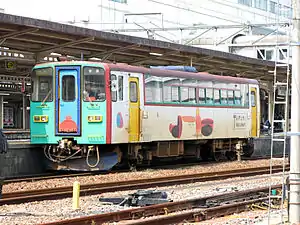Tarumi Line
The Tarumi Line (樽見線, Tarumi-sen) is a Japanese railway line in Gifu Prefecture, between Ōgaki Station, Ōgaki and Tarumi Station, Motosu. It is the only railway line Tarumi Railway (樽見鉄道, Tarumi Tetsudō) operates. There was a freight rail service that transported cement for Sumitomo Ōsaka Cement of Sumitomo Group Gifu factory. It once accounted for 40% of the whole revenue, but the freight operation ceased in spring 2006.
| Tarumi Line | |
|---|---|
 A "Haimo 230" railbus with exterior livery designed by Masuo Ikeda | |
| Technical | |
| Line length | 34.5 km (21.4 mi) |
| Track gauge | 1,067 mm (3 ft 6 in) |
Tarumi Line | ||||||||||||||||||||||||||||||||||||||||||||||||||||||||||||||||||||||||||||||||||||||||||||||||||||||||||||||||||||||||||||||||||||||||||||||||||||||||||||||||||||||||||||||||||||||
|---|---|---|---|---|---|---|---|---|---|---|---|---|---|---|---|---|---|---|---|---|---|---|---|---|---|---|---|---|---|---|---|---|---|---|---|---|---|---|---|---|---|---|---|---|---|---|---|---|---|---|---|---|---|---|---|---|---|---|---|---|---|---|---|---|---|---|---|---|---|---|---|---|---|---|---|---|---|---|---|---|---|---|---|---|---|---|---|---|---|---|---|---|---|---|---|---|---|---|---|---|---|---|---|---|---|---|---|---|---|---|---|---|---|---|---|---|---|---|---|---|---|---|---|---|---|---|---|---|---|---|---|---|---|---|---|---|---|---|---|---|---|---|---|---|---|---|---|---|---|---|---|---|---|---|---|---|---|---|---|---|---|---|---|---|---|---|---|---|---|---|---|---|---|---|---|---|---|---|---|---|---|---|
| ||||||||||||||||||||||||||||||||||||||||||||||||||||||||||||||||||||||||||||||||||||||||||||||||||||||||||||||||||||||||||||||||||||||||||||||||||||||||||||||||||||||||||||||||||||||
Basic data
- Distance: 34.5 km (21.4 mi)
- Gauge: 1,067 mm (3 ft 6 in)
- Stations: 19
- Track: Single
- Power: Diesel
- Railway signalling: Simplified automatic (ATS-S, ST)
- Stations with passing loops: 4 (Higashi-Ōgaki, Kitagata-Makuwa, Motosu, and Kōmi)
Stations
| Name | Distance (km) | Transfers | Location | ||
|---|---|---|---|---|---|
| Ōgaki | 大垣 | 0.0 | Tōkaidō Main Line Yōrō Railway Yōrō Line |
Gifu | Ōgaki |
| Higashi-Ōgaki | 東大垣 | 2.7 | |||
| Yokoya | 横屋 | 4.5 | Mizuho | ||
| Jūkujō | 十九条 | 5.5 | |||
| Mieji | 美江寺 | 7.5 | |||
| Kitagata-Makuwa | 北方真桑 | 10.8 | Motosu | ||
| Morera-Gifu | モレラ岐阜 | 12.5 | |||
| Itonuki | 糸貫 | 13.4 | |||
| Motosu | 本巣 | 16.2 | |||
| Oribe | 織部 | 17.5 | |||
| Kochibora | 木知原 | 20.2 | |||
| Tanigumi-guchi | 谷汲口 | 21.6 | Ibigawa, Ibi District | ||
| Kōmi | 神海 | 23.6 | Motosu | ||
| Takashina | 高科 | 25.2 | Ibigawa, Ibi District | ||
| Nabera | 鍋原 | 26.4 | Motosu | ||
| Hinata | 日当 | 28.3 | |||
| Takao | 高尾 | 30.5 | |||
| Midori | 水鳥 | 32.5 | |||
| Tarumi | 樽見 | 34.5 | |||
History
Approved under the Railway Construction Act[1] as a railway line from Ōgaki via Ōno in Fukui Prefecture to Kanazawa in Ishikawa Prefecture, construction began in 1935, was suspended during the Pacific War and resumed in 1952. The first section opened in 1956 between Ōgaki and Tanigumiguchi. Two years later, an extension to Mino-Kōmi (美濃神海) (present-day Kōmi) was made. Construction beyond there continued until it was suspended in 1979.
Freight services ceased in 1974, and in 1984 (due to its operating deficit, sparse traffic and dead end route) the operation and ownership of the line was transferred from the then Japan National Railways (JNR) to the third-sector Tarumi Railway. A major shareholder was the Sumitomo Cement Co., which began freight shipments from Motosu. The improved financial situation resulted in construction being resumed, and the extension from Kōmi to Tarumi 10.9 km (6.8 mi) opened in 1989. The Sumitomo cement traffic ceased in 2006, with the line becoming a passenger-only operation.
References
This article incorporates material from the corresponding article in the Japanese Wikipedia.
- Tetsudō Fusetsuhō (鉄道敷設法) Table 74 (別表第74号, Beppyō Dai74gō)
External links
| Wikimedia Commons has media related to Tarumi Railway. |
- Official website (in Japanese)